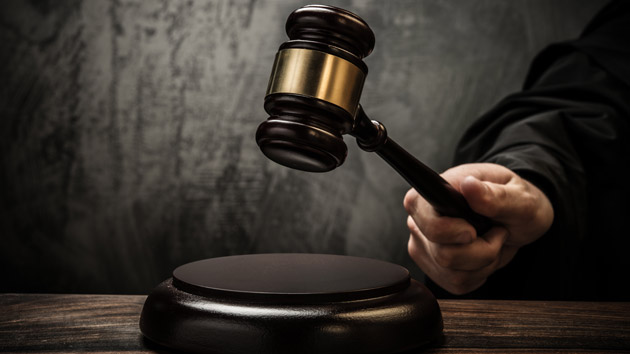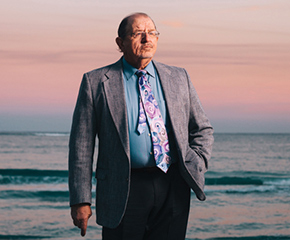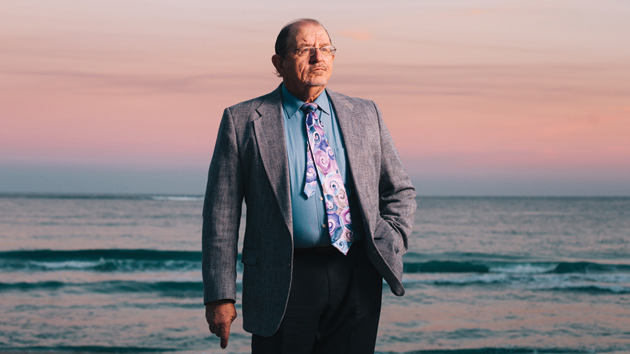
<a href="http://www.shutterstock.com/pic-140860966/stock-photo-judge-s-hold-hammer-on-wooden-table.html?src=h5kXOl-9MR6g2NtF27SqGg-1-11">Nejron Photo</a>/Shutterstock
In late November 2015, New Orleans police arrested a man named Joseph Allen for attempted murder in relation to one of the bloodiest nights the city had seen in years. Shots had broken out at a party in Bunny Friend Park, wounding 17 people. Allen was the first of several suspects to be detained after an eyewitness named him as a shooter.
Except that Allen hadn’t been in town at the time. Within a week of his arrest, his private attorney had tracked down footage of the 32-year-old shopping for baby clothes with his pregnant wife at three stores in Houston, Texas, putting him far from the crime scene. A week or so later, Allen learned that no charges would be filed against him—he was released from jail the next day.
In his office down the street from the Orleans Parish Criminal District Court, chief public defender Derwyn Bunton couldn’t help but think about what might have happened to Allen had he ended up with a public defender. In the wake of a budget crisis that had ravaged the Orleans Public Defenders Office several years earlier, Allen would’ve been lucky even to talk with one of the office’s overworked lawyers—there were 42 at the time—within any reasonable time frame. Only then would one of the office’s eight investigators have received a request to look into Allen’s case.
Bunton suspects his investigators wouldn’t have made it to Houston in time to obtain the store security footage that exonerated Allen. “I’m not going let people believe that everything is okay, that they get assigned a public defender and we’ve got that kind of resources,” Bunton told me, adding that two of the 10 Bunny Friend Park co-defendants are being represented by his office. “We don’t.”

This past January, with more budget cuts looming, Bunton’s office did something drastic: It began turning away clients. The American Civil Liberties Union quickly responded with a federal lawsuit against the Orleans Parish defenders and the Louisiana Public Defender Board that oversees them. The suit alleges that rejecting new cases amounts to leaving people languishing in jail without counsel in violation of the Constitution. Late last month, Bunton told the Times-Picayune that his office cannot afford to represent itself in the lawsuit.
“The lawsuit itself can’t change anything,” concedes Brandon Buskey, an attorney for the ACLU. “The political actors in Louisiana have to step up. The lawsuit can put pressure on them. It can point out that the system is unconstitutional. But if the state wants a better system, it has to fix it.”
In a court filing—and an interview with Mother Jones—Bunton denies that his actions were unconstitutional. “Is it better to violate the constitution by being incompetent and ineffective?” he says. “I think where we would be violating the Constitution and ethics and professional standards would be to continue to take on cases we don’t have the resources to handle.”
Bunton’s move was just the latest in a string of decisions since last July designed to keep the lights on at the struggling defenders office, which represents more than 80 percent of New Orleans’ criminal defendants. It has been a rough turnabout for an office that as recently as five years ago was cited by the Southern Center for Human Rights as “an inspiration” for its “vigorous client-centered representation.” Even then, the office was looking at a shortfall for 2012 and had begun to cut back on staff. “Louisiana is an extreme at this moment,” says Marc Schnidler, executive director of the nonprofit Justice Policy Institute. “How they got to where they are—that tells the story of indigent defense in this country.”
Like many of their peers around the nation, the Orleans Parish public defenders are saddled with massive caseloads on a shoestring budget. In 2014, the office’s 51 attorneys juggled more than 22,000 cases—a whopping 431 per lawyer—which included nearly 8,000 felonies and nine death penalty cases. And while rejecting clients was seen as a last resort, Orleans is not the only one doing it. Fourteen of the state’s 42 judicial districts have cut back on their defender services and six have stopped taking certain cases, according to James Dixon, chair of the Louisiana Public Defender Board.
The way the state funds defense for its poor is deeply flawed, criminal justice experts agree. Louisiana is the only state where public defenders rely heavily on income sources that fluctuate significantly. In its 2015-16 fiscal year, Orleans Parish got just 40 percent of its budget from the state—which faces a new shortfall of at least $800 million for the upcoming fiscal year. The rest of the money had to be found locally. Nearly 40 percent of the defenders budget relied on local court fines and fees. But according to a state Supreme Court report, the number of traffic tickets filed in Louisiana courts—already low post-Hurricane Katrina—has dropped by 29 percent since 2009. This has translated to a shortfall for public defenders. “What you have is a local funding crisis,” Dixon told me.
The chief justice of the Louisiana Supreme Court noted in a recent annual report to the legislature that numerous defender offices could face insolvency. “We’re funding public defenders offices off the backs of folks who can’t afford a lawyer,” explains Clarke Beljean, a Plaquimines Parish defender who worked at the Orleans Parish office for six years. The Defender Board’s 2014 report called the situation “unstable, unreliable, and untenable.”
And this system was supposed to be an improvement.
Prior to Katrina, impoverished defendants in Louisiana didn’t even have access to full-time public defenders. Instead, parish-level defender boards enlisted private lawyers to handle those clients. New Orleans was served by the Orleans Indigent Defender Program, which consisted of 54 attorneys with a slim $2 million budget, working part time out of a room in the courthouse.
The hurricane disrupted everything. In Katrina’s wake, according to a 2012 evaluation, only six attorneys were left to handle more than 6,000 open cases in Orleans Parish. The local defender board resigned, a new reform-minded group took over, and the Indigent Defender Program became the Orleans Public Defenders office. In 2006, it won a $3 million Justice Department grant for rebuilding efforts and to fund 40 positions for two years. New lawyers were recruited, salaries were increased, and the original lawyers were told to give up their private practices and focus on public defense. The office, which was adorned with donated furniture and equipment, found new digs and shifted its philosophy to a client-based model, meaning that public defenders would now be connected with defendants within a day of their arrest and stick with them throughout their case—instead of being assigned to a courtroom and handling whatever cases came through in a given day. In 2007, the legislature established the state Public Defender Board to oversee similar district offices.
Bunton was named Orleans Parish chief public defender in late 2008. Bolstered by grants and city and state funding, the office grew into a 72-attorney shop with 20 investigators and a $9 million budget. “If we were a stock, we were trending up,” Bunton says. But four years later, the office was hit with large cuts at both the state and local level—including a drop in traffic-ticket revenue. Bunton tearfully broke the news to staff: He would have to lay off 27 people.
The remaining attorneys, who already worked 60- to 80-hour weeks, had to pick up the slack. “It’s like, you’re already trying to keep your head above water while holding however many pounds of weight on your back and then they throw you a baby. You’re like, ‘What do I do?'” says former Orleans defender Clarke Beljean, who survived the cutbacks that day. “And then they throw you another one. And then they throw you a few more, and they’re like, ‘What do you mean, you can’t hold these seven babies above water?’ Honestly, that’s the feeling.”
Bunton’s lawyers routinely exceed the maximum recommended caseloads that many experts view as excessive. In 2015, the office had four attorneys handling roughly 9,500 misdemeanors—a rate nearly six times the recommended limit of 400 per lawyer. The offices’s 55 felony defenders had 7,705 cases that year, which falls within the 150-felony limit, but the office recently lost more lawyers, including veterans whose high-level cases had to be redistributed. Three months into 2016, the office projects that the 39 remaining felony attorneys are already exceeding the 150-case limit, its spokeswoman told me. As of April 3, the office had refused 53 cases and put another 56 on a waiting list.
A 2009 Department of Justice report noted that, to properly defend 91 percent of the city’s indigent defendants—private attorneys working pro bono would presumably handle the rest—the Orleans office would need an $8.2 million budget and 70 staff attorneys. In real life, Bunton’s office is projected to end up with just $5.9 million—$1 million less than it expected. About 30 percent of the shortfall is expected to come from subpar revenue from fines and fees. Meanwhile, the office has one-third fewer attorneys than the DOJ recommended, and about half as many as the DA’s office employs.
In a letter to city and state officials last June, Bunton outlined a cost-cutting plan he said would “likely cause serious delays in the courts and potentially constitutional crises” for criminal justice in New Orleans. A month later, his office imposed a hiring freeze. To make ends meet, the defenders office even resorted to crowd-funding. In September, after the comedian John Oliver did a segment about the problem on his HBO show, it raised just over $86,000 to help the office narrow its budget gap. At a November 20 hearing, Bunton asked the courts to stop sending his office new cases. In January, hoping to stave off further hardship, the New Orleans City Council shelled out $200,000 for the defenders. Jo-Ann Wallace, executive director of the National Legal Aid and Defender Association, says that Orleans Parish’s decision to turn away clients as a last resort is consistent with “their ethical obligation to provide zealous representation.”
On the state level, the Public Defenders Board is facing cuts that could range from 30 percent to 62 percent, Dixon told me. Under the latter scenario, two judges wrote in an op-ed, the board could “force the complete elimination of juvenile defense services statewide.” A final budget is due from the legislature in July.
As the Orleans office waits for the ax to fall, Bunton is ethically torn about the choices he’s been forced to make. “It sucks,” he says. “I don’t do this job to tell people no.” In fact, he’s embraced the ACLU lawsuit as a way to pressure state officials. Indeed, over the past decade, deluged defenders’ offices in Florida, Missouri, and Montana have turned away clients as a way to get legislators’ attention. It has worked, too. In 2013, Florida’s Supreme Court ruled that Miami-Dade County’s efforts to turn down cases was justified.
But what to do with those defendants in the meantime? Last week, private attorneys assigned to represent seven poor clients in Orleans Parish filed court motions requesting compensation—or permission to withdraw from the cases. Tulane law processor Pamela Metzger told CityLab that the clients in custody should be released: “You can’t make lawyers do this for free, or ask them to spend out of their own pocket for overhead and costs.” Assistant DA David Pipes countered, “It is their job to protect the rights and interests of their clients in their individual cases…If that means that a private lawyer must defend the poor without the certainty of knowing they are going to be paid, that is preferable to seeing justice denied, criminals turned loose, or victims and defendants languishing in uncertainty.”
On April 8, New Orleans Judge Arthur Hunter ordered the release of the seven clients, concluding that their rights to an effective attorney should not rest on “budget demands, waiting lists, and the failure of the legislature to adequately fund indigent defense.” He added,› “We are now faced with a fundamental question, not only in New Orleans, but across Louisiana. What kind of criminal justice system do we want? One based on fairness or injustice, equality or prejudice, efficiency or chaos, right or wrong?”
“There’s no such thing as Cadillac justice and Toyota justice. There’s justice, and there is injustice,” Bunton says. “And we are not going to be complicit in any injustice.”
















